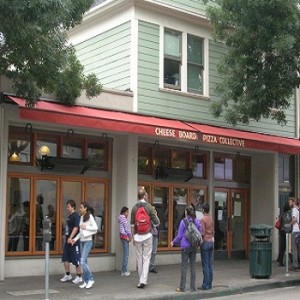 The Cheese Board was created in 1967 by two co-founders who had previously worked in Kibbutzes in Israel. By providing abundant choice of European style cheeses to Berkeley (over 300), the Cheese Board has become one of the most successful worker co-operatives in North America.
The Cheese Board was created in 1967 by two co-founders who had previously worked in Kibbutzes in Israel. By providing abundant choice of European style cheeses to Berkeley (over 300), the Cheese Board has become one of the most successful worker co-operatives in North America.
From the beginning the Cheese Board paid everyone the same, no matter what worker’s previous experience was or their seniority. The philosophy of the co-founders was that everyone’s time was worth the same. To this day the Cheese Board maintains this policy.
When the Cheese Board was created, the Berkeley area was home to many revolutionary thinkers. Many thought that there was a revolution happening. Part of the ideology was that business and money were evil. Many initiatives were created to buck the system. Since the Cheese Board charged for their items and paid their staff, some activists called them a ‘bourgeois’ co-op. When the revolution did not come, the Cheese Board was one of the few alternative initiatives that survived.
The Cheese Board has now spun off 4 other Arizmendi’s with the help of its own development and support co-op. Arizmendi is the nickname given to the founder of the Mondragon worker co-operative in Spain that now employs over 100,000 workers. There are now 140 workers all together in the Arizmendi Association of Cooperatives. They receive over double the average industry wages. The Cheese Board workers receive $21 an hour plus patronage dividends, in addition to health care, dental and a retirement savings plan. They work hard because they are all worker owners.
One of the balancing acts of the Cheese Board is providing a fair wage to its workers, a fair price to its suppliers and fair prices to their customers.
In 1997 the Cheese Board expanded now has 4 other Arizmendi franchises and another one on its way this year. These are financed by each Arizmendi franchise putting away 4% of their sales into the development and support co-operative. The workers of each new store determine their own wages. They start between $12 and $15 an hour and work their way up as they become more profitable. Applicants for new stores go through a 3 hour orientation session to explain the risks and rewards of the worker co-operative model and to ensure they are a good fit. New employees pay a $1,000 equity share to become a worker-member of Arizmendi (the Cheese Board’s equity is $5,000, since it has been around so long). The Cheese Board spin offs have decided to focus on pizza, bread and pastries, for they have found that cheese inventory is too expensive.
Each store runs on consensus. If a decision is time sensitive and consensus is not achieved there is a 75% majority vote. Workers have a once a month general meeting to make major decisions.
Though Arizmendi is not a utopia, it is a practical alternative business that provides decent wages and a democratic workplace to its workers.